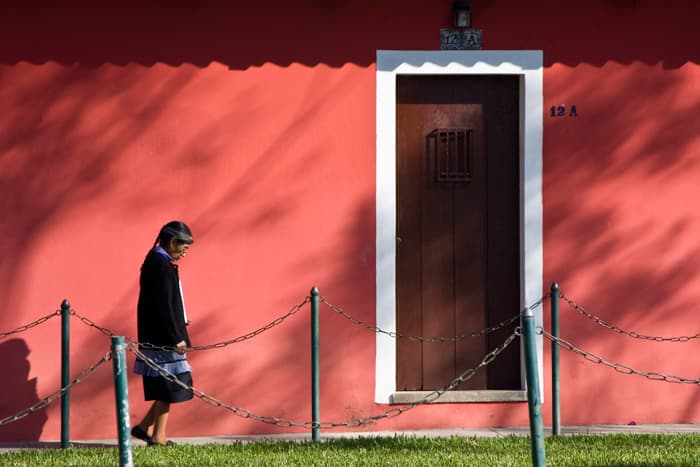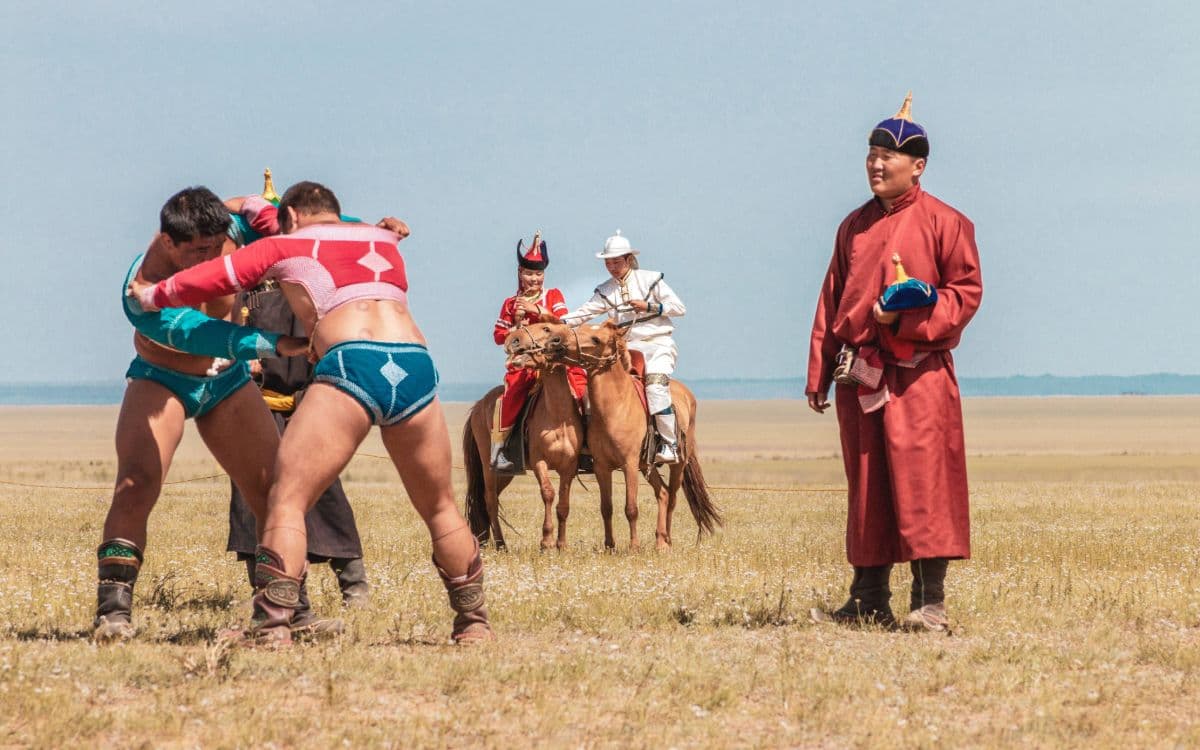Wanderlust

Feb 19, 2016
The Aunties of Chinatown, Guatemala City
Written by
Emily Ding

“Eat,” the women ordered, with stern generosity. “Don’t be shy.”
They hovered around me, spinning out a succession of homemade dishes onto a round table: won ton soup, cabbage fried with oyster sauce, braised pork cuts sandwiched in steaming white buns. The smell of garlic and onions clung to my clothes, and for a moment I imagined I was home in Malaysia, and that my mother, my grandmother, and my aunts were telling me to eat, Eat, girl, pausing only to puff with feigned modesty when I said, with my mouth full, “This is good.” It’s the way the Chinese show their hospitality. It’s the way they show love.
Then, amid the women’s Cantonese chatter, I heard the sound of Spanish rolling off practiced tongues. It was the middle of the afternoon, and I was in a dining room on the second storey of a nondescript block of shoplots in Chinatown, Guatemala City. At least, I think it was Chinatown. In my memory, the street was strangely, refreshingly, free of the forced authenticity of red lanterns and pagoda roofs.
Hong Kong Aunties
There were four women, whom I have taken to calling the “Hong Kong Aunties” whenever I tell this story. I will remember them forever for initiating me—however reluctantly—into my Central American gap year, more than seven years ago now. There was Mrs. Chang and her younger companion, Mrs. Liang, and Mrs. Fung and her mother, whom I just called “Po Po,” for “Grandmother.” They spoke to each other in their native Cantonese and used Spanish only with outsiders—the help, restaurant customers—or grandchildren more Latino than Chinese. On this occasion, it was Mrs. Fung’s daughter, Monica, and her fiancé, Alejandro—both born and bred in Guatemala City—who were speaking that rapid-fire Spanish, though they would revert to Cantonese with their elders. At some point, the conversation turned to the perils of traveling in Guatemala. And in this, too, they reminded me of home.
“You know, it’s very dangerous here,” Mrs. Fung said. “People get mugged, killed. You can’t just walk around the streets, and public transport isn’t always safe. We use a driver to get around.” Her brusque manner intimidated me, though I would quickly learn that it disguised a ready kindness.
Mrs. Chang took a gentler tone. “There are better places to travel to, you know, if you’re looking for adventure. Like Europe. How old are you? You look barely sixteen.”
“I’m twenty-two,” I said.
They made a unanimous sucking and hissing noise, as if in collective pain. “You’re lucky Mrs. Chang found you,” Mrs. Fung said. “Now, eat.”
In fact, I had approached Mrs. Chang and Mrs. Liang on the flight from San Francisco. Their mere presence was, because of our shared culture, reassuring to me. Despite many months of anticipation, I was suddenly taken over by uncertainty. Faced with so many inscrutable strangers on the plane, the making of friendly connections had seemed like a distant possibility, and I wondered if I was going to last a year out there. I knew nothing about Latin America. I’d never joined the Latin American Society at university. I’d never had any Latin American friends or boyfriends. All I had wanted was to go someplace completely unknown to me, that was relatively cheap, and where I could learn Spanish—and Central America fitted the bill.
It turned out that Mrs. Chang had lived in Guatemala City for about forty years before her husband died. Then she moved to San Francisco to live with her daughter, and now she was back to see her grandchildren and some old friends. She had an air of composure that I admired. I guessed that she was in her seventies, and though I could see that Mrs. Liang was caring for her, she seemed to know her way around and seemed always in control, like a gentle matriarch. As for Mrs. Liang, she still lived in Guatemala, and had just been to San Francisco for a short visit. My mother had fretted about my coming out here alone to a country with a name she couldn’t even pronounce properly, and I couldn’t wait to tell her about these women.
Guatemala City
When the plane had landed at La Aurora airport that morning, I had said goodbye to Mrs. Chang and Mrs. Liang. They had exchanged concerned looks and asked if I had a ride waiting for me and a place to stay for the night. Sheepishly, I said I didn’t. I had looked up my options in a guidebook, but I had made no reservations. I was young and full of bravado that year, and winging it had seemed like one way to make it all a big adventure.
“Look, I don’t know what you think of the idea, but you can come with us,” Mrs. Chang offered. “You can stay in my old flat. The bottom’s leased out to a Chinese restaurant, but you can take my old room upstairs if you’re not afraid of sleeping alone. No one’s lived in it for years, so it’ll need some cleaning, but once that’s done you can stay for as long as you’re in Guatemala City.”
“Yes, we’ll be staying across the street at a friend’s place, so we’ll be right there if you need us,” Mrs. Liang said.
That was how I found myself in the somewhat awkward situation of having gatecrashed a family reunion halfway around the world. Judging by the veritable stockpile of Chinese foodstuffs I had glimpsed earlier at customs inspection, crammed into their burgeoning suitcases, it was to be a momentous one.
Ana, Mrs. Chang’s twenty-two-year-old granddaughter, had come to pick them up from the airport. She had fair skin and you could tell by her features that she was mixed Cantonese-Latino, unlike her teenage brother, whose telltale nose—seemingly missing a bridge, like my own—was the only giveaway of his Cantonese heritage. I hung back as they greeted Mrs. Fung and Mrs. Liang in Spanish with a round of hugs and kisses, before Mrs. Chang gently pulled me forward and made the necessary and unwieldy introductions. It amuses me now to think of how Ana acted like it was nothing out of the ordinary, and we were soon huddled together in their car, my face pressed up against the window in the backseat. Later, as we entered the downtown area, I scanned the gritty streets and saw that several shoplots—even Chinese restaurants—were guarded by pot-bellied, armed men. It became what I would picture when the Aunties tried to impress upon me the dangers of traveling here, though when I asked Ana for her opinion, she smiled knowingly and said, “It’s not as bad as they say it is. There are places you can be safe here, where I go with my friends.”
In any case, I was in good hands. On my first day in Guatemala City, I had my first taste of desayuno chapin with Ana and her family in their home, located in one of the more affluent suburbs. It’s the typical Guatemalan breakfast of eggs scrambled with tomato, garlic, and onion, served with fresh cheese, boiled plantains, corn tortillas, and refried black beans. I followed Monica and Alejandro when they went hunting for their first home as a married couple, and tried to offer helpful opinions on one interior feature or another. I followed the Aunties to a cavernous Chinese supermarket where they went shopping for groceries, and was surprised at how complete it was. I rode along when they made house visits to old friends, while they tried to explain who I was. Mostly, they kept it simple: “Oh, she’s a friend of Monica’s.”
Letting Go
Later that evening, I joined the Aunties and their extended group of family and friends for dinner at Alejandro’s steakhouse. Again, I was reminded of home, and of what it’s like when my own extended family comes together. It’s that sensation of something both familiar and unfamiliar, of both belonging and not belonging, of feeling cocooned and also, just slightly, suffocated. I felt incredibly privileged for having been invited into their private lives, and I think my year would have turned out differently if it hadn’t been for them, but at the same time, it all felt a little too much like home. I worried that I would fail to start my gap year before it had even begun.
I told them that I had decided to leave for Antigua the next day. I had heard it was safer than Guatemala City and popular with travelers, I said, and I planned to start Spanish lessons there before continuing my travels. They were worried, but wished me all the best. Mrs. Fung insisted that I should let her driver take me instead of riding the public bus, and that she would send her son Fernando along to accompany me for the journey. I’d ceased to be surprised by how far they would go with their generosity towards a mere stranger.
Before we left the steakhouse, Ana’s mother took me aside and said, “I think of Ana going away on her own, doing what you’re doing, and I am so afraid for you. Please take care of yourself.” She handed me a piece of paper, scrawled with her contact number and Ana’s. “Don’t hesitate to call us if you need anything. Buen viaje.” It was the first time I had heard those words, and I found the mere sound of them strangely soothing, like a kind of christening. Ever since, I’ve taken it as a sign of good luck whenever someone wished it on me, and I’ve taken to sending off other travelers I meet the same way.
That night, when we returned to Mrs. Chang’s old room in Chinatown, we realized the taps weren’t running water. Mrs. Chang and Mrs. Liang smuggled me across the street to where they were staying so I could use the shower. I say “smuggled” because I was tightly sandwiched between them, our arms linked. They had made it seem like a mission of the highest, most dangerous order: scurrying across the street, making sure we were outside closed doors for the shortest possible time, turning the locks immediately behind them once they were safely inside. At some point, in the middle of all of it, we started giggling.
Later, back alone in Mrs. Chang’s old room, I started packing my bags in anticipation for the morning. Whatever uncertainties I had felt on the plane over from San Francisco had dissipated. Despite the Aunties’ well-intentioned warnings on the dangers of traveling alone, they had, in fact, helped me feel more at ease with the idea of spending a year in Central America—a region which had, up until then, never figured in my everyday consciousness. In retrospect, I think it had to do with the fact that they had showed me just how normal life could be in a place as foreign and as reportedly dangerous as Guatemala City, and how, in certain respects, it wasn’t so very different from life back home. Our common humanity and our capability to adapt make sure of that.
Connection
There was a framed painting hanging on a wall in Mrs. Chang’s old room: a portrait of her younger self, when she was not yet Mrs. Chang but just Jenny. And there was a demure red dress, sticking out of a storage box in a corner, that must have been hers. I tried to imagine her as she looked in the painting—the silky-straight, shoulder-length hair, her lips pursed slightly in a pensive expression—and wondered how she had come to be in Guatemala. Had her family moved here? Had she followed her husband here? Had she come, perhaps with a female companion like Mrs. Liang, seeking a different kind of adventure? What kind of life had she lived here? I never got a chance to ask.
That year, I ended up traveling across Guatemala, as well as other countries like Nicaragua, Mexico, and El Salvador, where I made new friends, including many Latin Americans who took me under their wing as the Aunties had done. I returned to Guatemala City a couple of times—during which the forbidding metropolis of my first impressions fell away—and dropped in to visit the Aunties. But by then, Mrs. Chang had returned to San Francisco, and I never saw her again. I like to think, though, that despite her best, protective instincts as a mother and a grandmother, maybe, just maybe, she knew a little of what had drawn me here, to this place not just physical but metaphorical, so far away from home.
#####
Emily Ding is a freelance writer, documentary researcher, and editor. She was conditioned on family road trips in Malaysia, spent her university years in England, and caught the incurable travel bug in Latin America. These days, she’s based in Malaysia half the time, but continues to travel for adventure, history, and culture—usually solo and, as much as possible, like a local. She blogs, intermittently, at lettersfromtherealworld.com.






